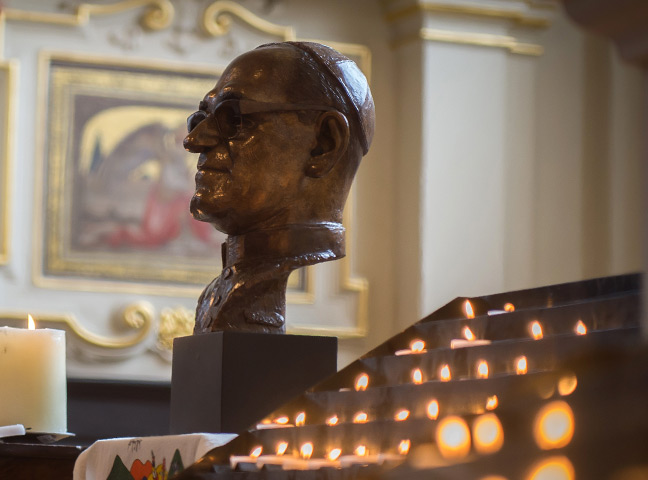
Bishop Patrick Lynch, Auxiliary Bishop of Southwark, gave this homily at a Mass for the Feast of Blessed Oscar Romero in Southwark Cathedral, 24 March. In his homily Bishop Pat looks at the story of the two disciples on the Road to Emmaus.
Full Homily
Nearly forty years ago Oscar Romero whilst reflecting on Luke’s story of the two disciples on the Road to Emmaus described the suffering and the desperation being experienced by the people of El Salvador. “Fields are abandoned when they should be planted. Animals are running wild because their owners have fled. Fear is seen in many faces and people speak with pain: ‘they have robbed us, they have killed us, they have wounded us`. How does the death and resurrection of Jesus” Romero asked “transform the desperation of the people of El Salvador today?”
The story of the two disciples on the Road to Emmaus is not just about the physical journey from Jerusalem to Emmaus but rather about the spiritual journey from disappointment and desperation to faith and hope. The two disciples are devastated when Jesus is killed. They believed that he was the person who would set Israel free so when He dies they are absolutely devastated. The journey away from Jerusalem to Emmaus is about how Jesus heals their sorrow, renews their faith and restores their hope and about how He does that in a very simple way – by reaching out to them, by listening to them, by open the Scriptures for them and by sharing a meal with them.
If you look closely at the passage in Luke’s Gospel you will see that Jesus takes the initiative. He comes up to them and walks by their side. He hears them talking and then asks the simple question “What things?” Immediately they pour out their hearts and share with him not only what has happened but how deeply the events have affected them. Jesus simply listens: He listens to what they say, He listens to how they are feeling and He listens to the disillusionment that is in their hearts. At that point He begins to give them hope and a reason to hope by explaining the Scriptures to them. He enables them to discover the strength, inspiration and courage they can get from the Scriptures. Finally, as they arrive in Emmaus they invite Jesus to share a meal with them and it is during the meal they recognise who He is but He disappears from their sight. Nevertheless, they are transformed and immediately, in the dark of night, they head back to Jerusalem to share their new found faith in the risen Lord healed from those attitudes and sentiments that prevented them from seeing – from believing – in the risen Jesus – sadness, foolishness and slowness of heart.
In this story Luke presents us with a very rich understanding of what it means to accompany those who are suffering. It means reaching out to and walking with those who suffer: it means listening to the stories and experiences of those who suffer: it means seeing and affirming God’s presence in the hearts and lives of those who suffer and it means building community amongst those who suffer. For Bl. Oscar Romero Christ’s Passover and consequently his own ministry amongst the people of El Salvador was always liberating, always sacramental and always communal. Whatever community or group he was serving or speaking to he sought always to free people from fear, to give people tangible signs of hope and help them experience God’s love through a deep sense of belonging to the Church.
In recent years Pope Francis, again and again, in his Exhortations, his homilies and his pastoral visits has like Bl. Blessed Oscar Romero, drawn on the rich theology of accompaniment that has been developed in Latin America over many years inviting us as the Church today; To reach out to those who suffer, To listen to those who suffer, To affirm God’s presence in the lives of those who suffer And to be at one with those who suffer.
Let us pray that through the intercession and example of Blessed Oscar Romero the Lord will help us to do that.